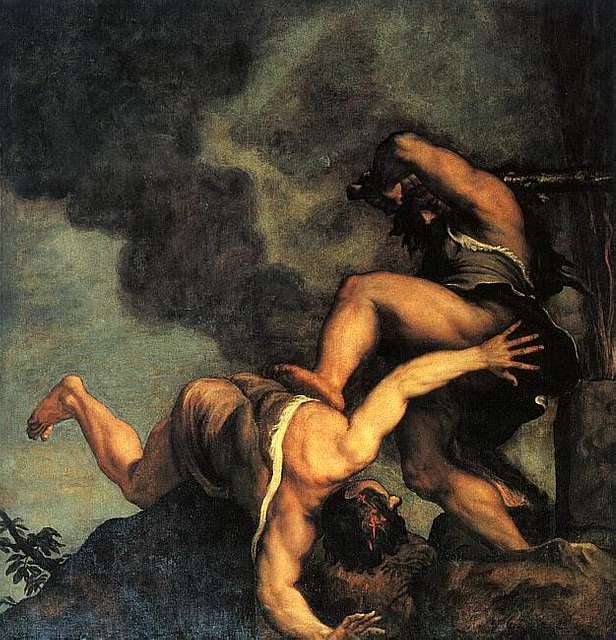When you go to a church picnic, you expect to maybe meet some folk you didn’t know, get to know a few a little better than you used to, but mostly laugh and play and joke around — you know, have a good time.
I went to a church picnic last week and ended up talking about murder.
No, I’m not talking about murder in general or a high profile case being covered in the media. Nothing so impersonal as that. I’m talking about a sweet elderly couple telling me over hamburgers and hot dogs that their 19-year-old grandson had just been murdered. The body was found just a few hundred yards from his home — not in a “bad”, or high risk, section of town, but in a quiet, safe, rural community. The kid was exemplary. Not only was he not a gang-banger, into drugs, or just generally rebellious, he was a believer, very active in his church and in his parent’s ministry. He wasn’t in the wrong place — he had merely been sent home from where the family was enjoying a camping trip together to get some things they needed on the campsite. The stuff he was supposed to come back with was found neatly piled in the living room, ready to be loaded into his car. The house was locked and the alarm armed when people came to investigate, with no sign of a struggle. And yet, apparently, the murder scene was rather gruesome. And it had all just happened, no more than 48 hours before his grandparents were telling us about it.
Who would do such a thing, and why? The boy had no enemies. Sure, he had just started working as an apprentice at a local correctional facility, but even in a prison environment, who had anything to gain by hunting down this young man at his home? “This is just more evidence of how sick this world is,” I thought. Another episode of mindless, pointless violence.
Yesterday we learned that the police arrested his brother for the crime.
Yes, we’ve all seen enough episodes of Law and Order and CSI to know that things are not always as they appear, that innocent people are falsely accused, and that everyone is innocent until proven guilty. But in the real world, people don’t have screenwriters to set up quirky twists and turns, and most of the time, the people police arrest are actually guilty — regardless of what holds up in a court of law. In this case, they arrested the victim’s brother. One brother savagely murdered the other one (as if there were an un-savage way to do such a thing).
We don’t know why. Last I heard, the family hadn’t even been allowed to speak to the accused since he had been arrested. But it really doesn’t matter, does it? Do you think there is really going to be any satisfactory answer to the question “why”? In the history of the world has there ever been an acceptable logical explanation for why a young man would kill his brother? And, while we all instinctively ask the question, do we really want to know the answer?
My mind is immediately drawn to Cain and Abel. The first sin recorded after the expulsion from the Garden of Eden is one brother viciously murdering the other. God accepted Abel’s sacrifice, but didn’t accept Cain’s, so Cain killed Abel. What sense does that make? What line of reasoning gets you from point A to that point B? I mean, when Absalom, the son of David, murdered his brother Amnon in 2 Samuel 13, at least one can follow the bouncing ball in Absalom’s head: Amnon had raped their sister, Tamar, so Absalom deceived and murdered Amnon. Absalom was just as wrong and unjustified to kill his brother as Cain was to kill his, but I can at least sympathize with the emotion that would have driven Absolom to his act. I just don’t understand Cain at all.
The most remarkable thing about Cain’s attitude is that he appeared to feel no remorse, even when he was confronted about it after the fact. “Am I my brother’s keeper?” he asked when God inquired about Abel’s whereabouts. Those words betray the disdain and hatred that he still harbored against Abel even after he had killed him. The Scriptures record that he first said, “I don’t know.” That would have sufficed to answer the Lord’s question, but Cain couldn’t leave it at that. Instead, he chose to add the now infamous barb which all of us since have used at one time or another to claim a waiver of liability for an ill that we have perpetrated on a brother. With that little rhetorical question he confirmed the hideousness of his crime. It was no accident. He planned it. He wanted it. He enjoyed it. And if given the chance, he would do it again.
I know it’s impossible to surprise an omniscient God, but you can almost hear the shock and disbelief in God’s reply, “What have you done?” I guess I’m not the only one who doesn’t follow Cain’s derailed train of thought. In fact, can’t you imagine Adam and Eve having the same reaction? Eve named him Cain, “gotten one,” because she was convinced she had gotten the one God promised would solve the problem of sin. Instead, he had become sin’s poster chiild. He was supposed to crush the serpent’s head, but he had crushed his brother’s instead. What had he done? I’m sure she and Adam never regretted eating the fruit more in their entire lives than they did the day Cain murdered Abel. For the first time, they saw the consequence of their disobedience played out to its most extreme end on a human. What had he done? What had they done? What had they not done that they should or could have to prevent such a horrible thing?
I cannot imagine the intensity of the grief, anger, and despair that the family of my friends will have to deal with the rest of their lives. On the day that a brother murders a brother, both die. And if the God who created us is moved to question it, you can know that there exists no answer that satisfactorily answers all the questions. I know there is peace and hope to be found, but it doesn’t come in the form of answers to questions; rather, it comes in spite of the questions.
I have a brother, my only sibling, and while we have had our share of disagreements through the years, it never once occurred to me (thank God) to murder him. Yet, I am convicted by Cain’s rhetorical question: “Am I my brother’s keeper?” Since it was a rhetorical question, I think we tend to gloss over it and not discuss it, because the answer is obvious. In fact, is that not the whole point of rhetorical question, that it needs no reply because the reply is obvious? (Did you see how I did that?)
Jesus told us that anyone who is angry with his brother, or calls him stupid or a fool, is just as guilty as Cain. I’ve never come close to physically snuffing out my brother’s life, but I have been angry with him, and I have called him worse things than stupid or fool. Not lately, and not currently, mind you, but I have done it in the past. The shame of it all is that, when confronted with my attitude, most of the time I didn’t respond with a remorseful “What have I done?” Instead, I usually adopted Cain’s posture. He deserved it. He had it coming. Didn’t you see what he did to me? Am I my brother’s keeper?
The painful reality is that we are just like Cain. Like Cain, we expect the rhetorical answer to “Am I my brother’s keeper?” to be “no”; but the mere fact that we ask it in the first place implies that we understand the answer is really “yes”. As God’s conversation with Cain continued, it became apparent that Cain’s issue wasn’t that Abel had done something spiteful to him, but with his unwillingness to take responsibility for the fact that he had offered an unacceptable sacrifice. I do, regretfully, understand that much of Cain’s reasoning. Like Cain, I would much rather deflect ownership for my sin by comparing myself to someone else, or by declaring him to be responsible for my bad act. I don’t know about you, but when my brother and I got into it as kids, “He made me do it” never once got me out of trouble, despite the numerous times I tried it. It didn’t work for Cain, either.
So the next time someone cuts you off in traffic, makes a decision you don’t agree with, treats you or someone you love unfairly, or perpetrates any other form of sin or injustice upon you — stop, and think. You are your brother’s keeper; and, like it or not, one way or the other, that insolent, insensitive, ignorant, or just plain evil person is your brother. You cannot afford to let hatred take up residence in your heart, for as soon as you do, you have committed homicide. Even if you never raise a finger against that person, you will have become Cain. With every excuse you offer to justify your hate, you are defiantly proclaiming, “Am I my brother’s keeper?” to which God shakes His head in disbelief and answers, “What have you done?”
Jesus was wounded for our transgressions. He was bruised for our iniquities. The chastisement that we deserved He took upon Himself that we might have peace. It is by His stripes that we are healed. So when you are tempted to hate, be your brother’s keeper. Preserve his life. Measure the injustice you have suffered against the injustice you have inflicted upon Christ, and make the choice to not join the ranks of Cain and Absalom.


